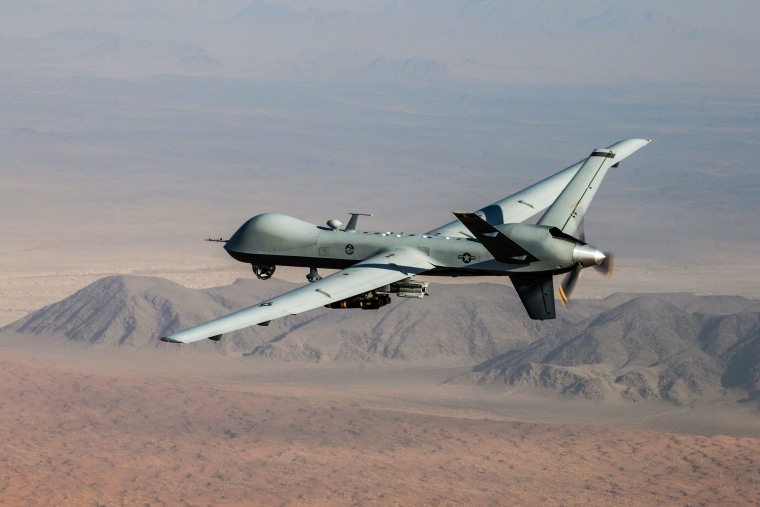Russian jet harasses and then collides with U.S. Reaper drone over Black Sea
Black Sea #BlackSea

A Russian fighter jet harassed and then collided with a U.S. drone over the Black Sea on Tuesday, forcing the U.S. to bring the MQ-9 Reaper drone down in international waters, U.S. European Command said.
“Our MQ-9 aircraft was conducting routine operations in international airspace when it was intercepted and hit by a Russian aircraft, resulting in a crash and complete loss of the MQ-9,” said Air Force Gen. James B. Hecker, the commander of U.S. Air Forces Europe and Air Forces Africa. “In fact, this unsafe and unprofessional act by the Russians nearly caused both aircraft to crash.”
Two Russian Su-27 fighter jets tracked the U.S. surveillance drone as it flew in international airspace over the Black Sea, which borders Turkey, Ukraine and Russia, among other countries. Before the collision, the jets “dumped fuel on and flew in front of the MQ-9 in a reckless, environmentally unsound and unprofessional manner,” according to a statement from U.S. European Command.
 An MQ-9 Reaper flies a combat mission over southern Afghanistan.Lt. Col. Leslie Pratt / U.S. Air Force file
An MQ-9 Reaper flies a combat mission over southern Afghanistan.Lt. Col. Leslie Pratt / U.S. Air Force file
At about 7 a.m., one of the jets struck the drone’s propeller, forcing the U.S. to bring it down.
Two U.S. defense officials said the Russian jet that collided with the drone did not crash but instead landed in Crimea.
The officials said it is the first time they are aware of that a Russian jet has dropped fuel on a U.S. aircraft during an intercept.
The Defense Department press secretary, Brig. Gen. Pat Ryder, said the U.S. believes the collision was likely to have caused some damage to the Russian plane.
The U.S. has wiped out the drone’s software and is considering its salvage options for the wreckage, but the Russians can reach whatever remains of the drone faster than a U.S. ship, the officials said. The U.S. would need to send a ship through the Bosporus from the Mediterranean into the Black Sea, while the Russians have ships in the Black Sea.
The Turks have resisted permission for U.S. and other warships to transit the strait in recent months, the officials said.
In a statement, the Russian Defense Ministry said Russia detected the drone flying over the Black Sea “near the Crimean Peninsula in the direction of the state border of the Russian Federation” and scrambled jets to identify the intruder.
The ministry said the two Russian planes did not use weapons, “did not come into contact with the unmanned aerial vehicle, and returned safely to their home airfield.”
The ministry said the drone was flying with its transponders off, “violating the boundaries of the temporary airspace regime established for the special military operation, communicated to all users of international airspace, and published in accordance with international standards.” Russia refers to its invasion and occupation of Ukraine as a “special military operation.”
According to the defense officials, the chairman of the Joint Chiefs of Staff, Gen. Mark Milley, plans to call his Russian counterpart, Gen. Valery Gerasimov, about the incident but they have not yet connected.
An official said that the Russian pilot showed “complete ineptitude” and that it was shocking to see such poor flying by a military pilot in an operation environment.
The U.S. summoned Russian Ambassador Anatoly Antonov to the State Department over the incident, State Department spokesperson Ned Price told reporters Tuesday, to convey the “strong objections” of the U.S. to this “unsafe unprofessional intercept.” A Tuesday afternoon meeting between Antonov and the assistant secretary for Eurasian Affairs, Karen Donfried, lasted less than an hour, a senior State Department official said.
In Moscow, the U.S. ambassador to Russia, Lynne Tracy, conveyed “a strong message to the Russian Ministry of Foreign Affairs,” Price said. The U.S. first engaged with allies and partners at high levels to brief them on what they knew as they were still learning details of the incident.
Price declined to speculate on any potential intentions or motivations behind the incident, instead accusing Moscow of incompetence.
The European Command statement said that the incident “demonstrates a lack of competence” on the part of the Russians, “in addition to being unsafe and unprofessional,” and that it is part of a pattern of dangerous behavior by Russian pilots while interacting with U.S. and Allied planes.
Said Hecker, “U.S. and Allied aircraft will continue to operate in international airspace and we call on the Russians to conduct themselves professionally and safely.”
The U.S. said it routinely flies aircraft in Europe in both sovereign and international airspace in accordance with international law and with the approval of host nations “in order to bolster collective European defense and security” and “support Allied, partner, and U.S. national objectives.”
Courtney Kube
Mosheh Gains
Abigail Williams and Jean-Nicholas Fievet contributed.